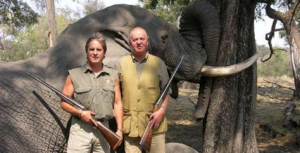News
Latest Lion Aid News
The hunting industry and money
Monday 25th November 2013

I’m the King of Spain (on the right) and a past patron of WWF It seems that if you are a trophy hunter you are required to learn some phrases by heart. Or perhaps keep them on a laminated card in your wallet and whip them out when you quickly need to make points about the benefits of hunting. You need not necessarily believe what you say, but you must practice in the mirror at least once a week to ensure an earnest-sounding delivery. These are the top ten phrases:
Hunters might overstate their case, but they do work hard to present their point of view and they do have some facts right. They also have the ear(s) of many in African governments and those in the USA, the EU and the BRIC countries. They have very many sponsors on the Forbes Rich List. They are supported by many royal families. They award prizes to Ministers from African countries who support trophy hunting. When Botswana placed a moratorium on lion hunting in 2001, the Safari Club International delivered a letter to the Botswana President urging him to reverse the decision signed by former US President George Bush Snr, former Vice President Dan Quayle, and former General Norman Schwarzkopf. Big guns. When Zambia placed a moratorium on lion hunting the SCI paid for Minister Masebo to attend their convention and raised $1.5 million for lion “conservation” in a single night. Hunting organizations have specialized and well-paid lobbyists who stalk their prey in the corridors of power. Hunting organizations fund scientists and unearth economists to produce glowing reports about the benefits of hunting. Hunters have deep pockets, big names, many connections and huge focus. Conservation organizations, while they might represent the vast majority of people who do not see the benefit of trophy hunting, are less focused. Many are these days spending their time and money on illegal wildlife trade issues, combating poaching of commercially valuable species like elephants and rhinos, and attempting to change minds in consumer countries about buying rhino horn and ivory. Meanwhile others dally with the legalization of the same products. These conservation organizations seek support from “celebrities” like Leonardo di Caprio, whose foundation then donates money back to WWF – so round we go again. Some hunting organizations are shaping up. But it would seem that the majority of hunting operators are resistant to change, especially when it comes to adequately compensating communities and playing fair with disclosure about their income and how effectively they conserve versus consumptively utilize wildlife. Edna Molewa, Minister of Environment in South Africa said recently that hunting benefited the South African economy to the tune of R6.2 billion per year – that translates to about $615 million. Another estimate put the benefit of foreign trophy hunting to South Africa at R811 million in 2012, or about $80.5 million. That leaves a shortfall of $534.5 million between the two estimates. All is fair in love and war in terms of making claims, but let’s have some realistic economic assessments. And then let’s objectively evaluate what are now opposing positions of benefits of hunting versus non-consumptive tourism and most important of all the relative conservation benefits under one model or another. It is in the interest of everyone to ensure wildlife exists for many future generations. So let’s have the hunters engage in an honest and transparent debate rather than what they are instructed on the cards in their wallets. We will await your response. Picture credit: http://bit.ly/1bii6Fd If you have not already signed up to our mailing list, you can add your name here and keep up to date with our ongoing work and, most importantly, DONATE to support our continuing work to conserve the remaining fragile lion populations and bring you the latest information. Thank you
|
Posted by Chris Macsween at 17:49
No comments have been posted yet.
Add a new comment
Existing user
New user sign up



